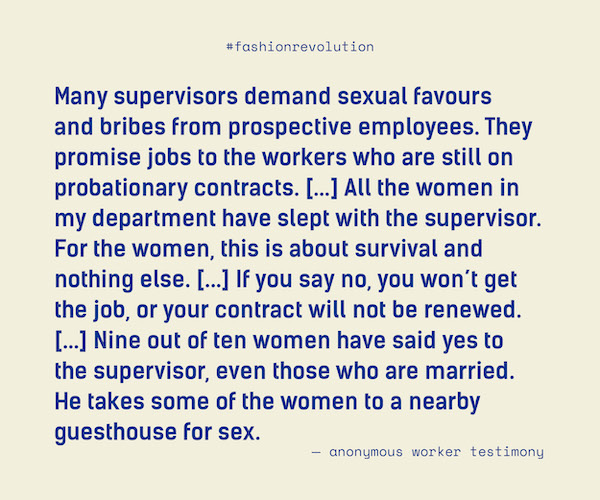The Hidden Blues in Your Denim
Ever wondered how your favourite pair of jeans came into being? Ever paused to think who transformed cotton into the intricaticate piece of fashion statement hanging in your closet? If the answer to the above questions is no, don’t worry, you are not alone.
Denim jeans have been an iconic part of modern fashion since their introduction in the 1800s. They pass through many hands during the manufacturing process before reaching us. Unfortunately, the lives of these very crucial links in the supply chain are anything but glamorous and are often rife with stories of rampant physical and sexual violence.
Let us go back to our question of who makes our jeans. In Lesotho, denim comprises a large part of the textile industry, supporting around 13,000 jobs. Lesotho is a land-locked country in Africa and one of the leading garment exporters to North America. The garment industry in Lesotho accounts for more than 90% of formal manufacturing jobs and contributes to 20% of the GDP. The mills specialize in the manufacture of denim fabrics and boast clients like Levi’s and VF Corporation (Lee and Wrangler). In 2019, with over 50,000 workers, garment manufacturing was the biggest employer in the country, surpassing even the public sector. More than 80% of these workers are women, and reports suggest widespread sexual abuse and gender-based violence.
In Lesotho, some workers earn less than the cost of a pair of an average jeans (around 60 euros) per month and are subject to dehumanising working conditions. Reports suggest that for many women, verbal abuse, inappropriate touching, sexual demands, and offensive sexual comments are part of their everyday nightmarish reality. Often being the breadwinners of the family, women fear retaliation at both home and work upon reporting these instances and investigations have shown that these fears are not unfounded.
Last year, the Workers Rights Consortium (WRC) NGO released a shocking expose detailing rape, sexual assault and harassment, via both verbal statements and unwanted sexual contact, at three major denim factories in Maseru, the capital city of Lesotho. The three garment factories are owned by the Taiwan-based global jean manufacturer, Nien Hsing Textile Co., Ltd. (“Nien Hsing”) and collectively employ roughly 10,000 workers.
It was found that across all three factories women were regularly coerced into sexual activities with supervisors to retain or gain employment or job promotion. A lot of these women were initially hired on a probationary basis and were pressured to have sex with supervisors/managers to get permanent/continued employment. The following testimonies highlight the blatant advantage taken of their vulnerable positions.
“Many supervisors demand sexual favours and bribes from prospective employees. They promise jobs to the workers who are still on probationary contracts. […] All the women in my department have slept with the supervisor. For the women, this is about survival and nothing else. […] If you say no, you won’t get the job, or your contract will not be renewed. […] Nine out of ten women have said yes to the supervisor, even those who are married. He takes some of the women to a nearby guesthouse for sex.”
Women faced sexual harassment not just from the managers but also from their male co-workers, which is both a result and perpetrator of a culture that does not condemn or punish such predatory behaviour.
“[A male worker] put [one of] his hand[s] on my breast and [the] other [hand] on my private parts. I reprimanded him. This is common practice because it is a male-dominated department [i.e., the washing department]. They [the male workers] usually claim that they are ‘playing.’”
Some women revealed that they had contracted HIV from their supervisors who refused to pay them salaries till they agreed to have unprotected sex. Those who reported the supervisors to the human resources department are demoted or worse fired.
 Mohapi, recounted her tale when interviewed by a Guardian reporter last year. At 23, when she finished her probation at one of the factories she was recommended by her supervisor for a full-time job. She was over-joyed as this meant a regular income to sustain her family. However, a few weeks later before the end of her shift, her supervisor asked her to follow him to his room where he proceeded to lock the door and close the blinds. He told her to be grateful and became aggressive when she resisted his advances. Mohapi then fled his office and in shock went straight to the HR. By the end of the day she had lost her job with a letter attached to her file stating insolence and insubordination thus diminishing her chances of finding employment.
Mohapi, recounted her tale when interviewed by a Guardian reporter last year. At 23, when she finished her probation at one of the factories she was recommended by her supervisor for a full-time job. She was over-joyed as this meant a regular income to sustain her family. However, a few weeks later before the end of her shift, her supervisor asked her to follow him to his room where he proceeded to lock the door and close the blinds. He told her to be grateful and became aggressive when she resisted his advances. Mohapi then fled his office and in shock went straight to the HR. By the end of the day she had lost her job with a letter attached to her file stating insolence and insubordination thus diminishing her chances of finding employment.
In the instances when supervisors are found to have engaged in sexual harassment, bribery, or other forms of misconduct, they are simply transferred among the departments, rather than being disciplined thus continuing the cycle. The environment essentially works to discourage victims from coming forward and reinforces the hopelessness of their situation.
The Lesotho expose is very concerning as these factories supply denim to some of the most famous brands globally. The brands had all conducted third-party social audits intended to identify cases of human rights violations but never detected the abuse happening at such a massive scale. For years, activists and campaigners have been repeatedly saying social audits don’t work and fail women because they rely on anecdotes from workers who fearing retaliation do not reveal the true nature of their conditions. They are often misleading and allow brands to avoid ownership by shifting responsibility to the suppliers.
This is why the bombshell report by WRC on Lesotho factories is a big milestone and has forced companies to take ownership of the human rights violations in their supply chain. The expose has led to the first credible attempt by the fashion industry to deal with gender-based violence in their factories. Levi Strauss & Co, Kondoor Brands, which owns Wrangler and Lee jeans, and The Children’s Place, signed a legally binding agreement called the “Lesotho Agreement” with Nien Hsing Textile and agreed to partially fund a program to end sexual harassment in five factories for two years.
Under the agreement, five trade unions and two women’s groups worked with WRC to design a program to curb gender-based violence and harassment. The factory management signed the agreement under which an independent body to investigate cases of sexual harassment have been created. The independent body has the power to enforce remedies per Lesothan law in case of violations and dismiss those found guilty. The factories have also pledged to install safe reporting processes, and promote more women to managerial roles and offer to counsel for women.
However, to this date, there is no record of even a single manager being prosecuted for the crimes they committed against these women. It is unclear whether any action has been taken against those reported by the brave women who came forward with their stories. Unfortunately, this indicates that the historic agreement might not be enough to solve the problem in Lesotho, let alone the garment industry globally.
The implementation of the Lesotho Agreement had just started when the COVID-19 pandemic hit. The impact on the fashion industry has been particularly severe and brands have responded to the pandemic by enforcing the “force majeure” clauses in their supplier contracts. The Center for Global Workers Rights and WRC estimated that the revenue loss to suppliers and garment workers from these cancelled orders amounts to at least £16.2 billion.
Before the COVID-19 lockdown, there had been a significant and noticeable improvement in working conditions at the Lesotho factories. The unions even managed to negotiate exit packages for the retrenched employees thus highlighting the important role of unions and NGOs in providing legal services and anti-retaliation protections. However, with many factories on the verge of shutting down and operations stalled the situation is reportedly getting worse for women. The progress made after the WRC report is in jeopardy with women put in an even more vulnerable position as millions of low-paying workers are on the verge of destitution all over the world.
Although it has been three years since the #MeToo movement launched, the garment industry’s horrifying sexual harassment problem has shockingly still not received the level of attention it deserves. The WRC report is the first of its kind to link big fashion labels explicitly to gender-based sexual violence in Lesotho factories. However, Lesotho is a relatively small garment exporter and manufacturer compared to countries like India, Bangladesh, Mexico, Sri Lanka, China, Turkey, and Vietnam.
Most of the workers in these countries work long hours without contracts and are not protected under labour laws, the majority of them being women. An ActionAid report in 2019 estimated that 80% of all Bangladeshi women garment workers had faced sexual violence in the workplace. In India, more than 50% of garment workers have experienced verbal abuse. The statistics for each country are equally upsetting and recount dreadful accounts of women being assaulted, stalked, groped, harassed, and raped in factories making clothing for international brands. The pandemic has been particularly devastating for suppliers and garment workers in these countries and left in ruins. The powerful fashion retailers have the moral obligation and financial responsibility to protect those at the bottom of their supply chain.
The grim status of women in garment factories is the product of human deprivation being exploited by those wielding power. It is a vicious cycle where women are forced to work in factories to survive and sustain their families. They are often contract workers paid minimum wage to slash down the manufacturing cost and hike up the retailers profit margins. With no job security and legal protection, they are exposed to relentless harassment. The culture of impunity and stigmatisation then leads to a hesitation in reporting thus continuing the cycle.
Brand leaders and policymakers should work together to strengthen women’s leadership, educate workers of the laws and their rights, improve reporting processes and mechanisms, increase political awareness to pass and implement laws protecting women. Global brands should take notes from the Lesotho agreement’s strong anti-retaliation protection and alignment with the treaty against workplace violence and harassment adopted by the International Labour Organization. They should commit and take responsibility to create a dignified, safe and financially secure work environment for garment workers.
As consumers, we should actively support fashion labels who are stepping up to ensure a safe, ethical, and respectful working space even for their lowest-paid supply chain worker. Most importantly we can do our part by simply demanding an answer from our favourite brands to a very simple question – who makes our jeans?
The workers’ names in this piece have been changed.Anvita is a Singapore based sustainability professional, passionate about creating awareness and developing solutions for the societal and environmental challenges we face today.
SOURCES:
Unlocking the potential of Lesotho’s private sector: a focus on apparel, horticulture, and ICT - World Bank Female Labour in the Textile and Clothing Industry of Lesotho, Carolyn Baylies and Caroline Wright [https://www.tralac.org/news/article/11501-lesotho-s-textiles-apparel-and-footwear-manufacturing-industry.html] [https://freedomfund.org/blog/cancelled-orders-and-factory-closures-the-devastating-impact-of-covid-19-on-workers-in-garment-supply-chains/] [https://www.levistrauss.com/2019/08/15/responding-to-reports-of-harassment-in-lesotho-factories/] [https://face2faceafrica.com/article/lesotho-women-making-jeans-for-levis-and-wrangler-forced-to-have-sex-with-bosses-to-keep-jobs] [https://thewire.in/world/lesotho-rights-group-exposes-rape-culture-in-levis-and-wrangler-factories] [https://www.globalfundforwomen.org/garment-industry-violence-infographic/]








